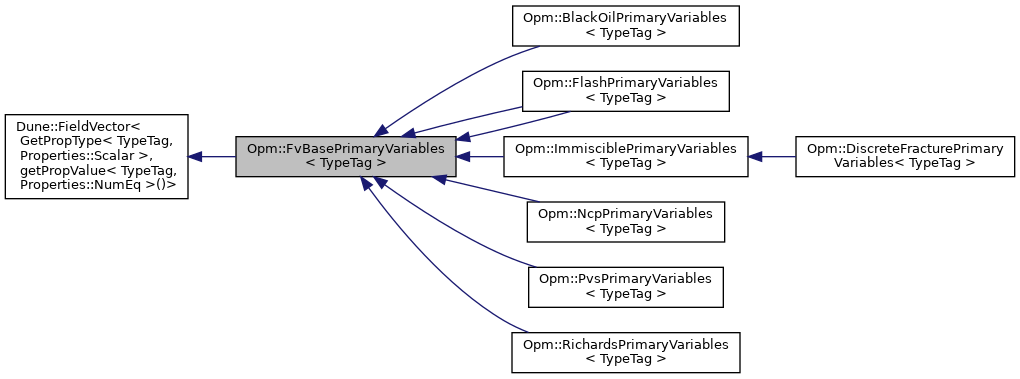Represents the primary variables used by the a model.
More...
#include <fvbaseprimaryvariables.hh>
template<class TypeTag, template< class, int > class VectorType = Dune::FieldVector>
class Opm::FvBasePrimaryVariables< TypeTag, VectorType > Represents the primary variables used by the a model.
◆ FvBasePrimaryVariables() [1/3]
template<class TypeTag , template< class, int > class VectorType = Dune::FieldVector>
◆ FvBasePrimaryVariables() [2/3]
template<class TypeTag , template< class, int > class VectorType = Dune::FieldVector>
template<class OtherTypeTag , template< class, int > class OtherVectorType>
Copy constructor from another primary variables object.
- Note
- This is typically for converting from CPU to GPU primary variables representations and vice versa.
◆ FvBasePrimaryVariables() [3/3]
template<class TypeTag , template< class, int > class VectorType = Dune::FieldVector>
Assignment from another primary variables object.
◆ assignNaive()
template<class TypeTag , template< class, int > class VectorType = Dune::FieldVector>
template<class FluidState >
Assign the primary variables "somehow" from a fluid state.
That is without considering any consistency issues which the fluid state might have. This method is guaranteed to produce consistent results if the fluid state is consistent to the properties at a given spatial location. (Where "consistent
results" means that the same fluid state can be reconstructed from the primary variables.)
◆ checkDefined()
template<class TypeTag , template< class, int > class VectorType = Dune::FieldVector>
Instruct valgrind to check the definedness of all attributes of this class.
◆ init()
template<class TypeTag , template< class, int > class VectorType = Dune::FieldVector>
< Import base class assignment operators.
◆ makeEvaluation()
template<class TypeTag , template< class, int > class VectorType = Dune::FieldVector>
Return a primary variable intensive evaluation.
i.e., the result represents the function f = x_i if the time index is zero, else it represents the a constant f = x_i. (the difference is that in the first case, the derivative w.r.t. x_i is 1, while it is 0 in the second case.
◆ operator=()
template<class TypeTag , template< class, int > class VectorType = Dune::FieldVector>
◆ registerParameters()
template<class TypeTag , template< class, int > class VectorType = Dune::FieldVector>
The documentation for this class was generated from the following file:
|
